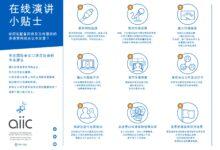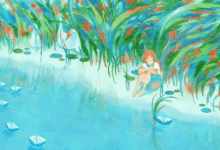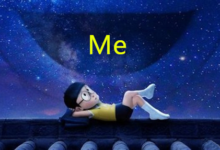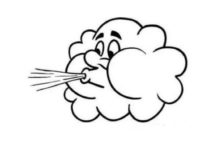Letter to Daniel
Daniel Patrick Keane was born on 4 February, 1996.
My dear son, it is six o’clock in the morning on the island of Hong Kong. You are asleep cradled in my left arm and I am learning the art of one-handed typing. Your mother, more tired yet more happy than I’ve ever known her, is sound asleep in the room next door and there is soft quiet in our apartment.
Since you arrived, days have melted into night and back again and we are learning a new grammar, a long sentence whose punctuation marks are feeding and winding and nappy changing and these occasional moments of quiet.
When you’re older we’ll tell you that you were born in Britain’s last Asian colony in the lunar year of the pig and that when we brought you home, the staff of our apartment block gathered to wish you well. “It’s a boy, so lucky, so lucky. We Chinese love boys,” they told us. One man said you were the first baby to be born in the block in the year of the pig. This, he told us, was good Feng Shui, in other words a positive sign for the building and everyone who lived there.
Naturally your mother and I were only too happy to believe that. We had wanted you and waited for you, imagined you and dreamed about you and now that you are here no dream can do justice to you. Outside the window, below us on the harbor, the ferries are ploughing back and forth to Kowloon. Millions are already up and moving about and the sun is slanting through the tower blocks and out on to the flat silver waters of the South China Sea. I can see the contrail of a jet over Lamma Island and somewhere out there, the last stars flickering towards the other side of the world.
We have called you Daniel Patrick but I’ve been told by my Chinese friends that you should have a Chinese name as well and this glorious dawn sky makes me think we’ll call you Son of the Eastern Star. So that later, when you and I are far from Asia, perhaps standing on a beach some evening, I can point at the sky and tell you of the Orient and the times and the people we knew there in the last years of the twentieth century.
Your coming has turned me upside down and inside out. So much that seemed essential to me has, in the past few days, taken on a different color. Like many foreign correspondents I know, I have lived a life that, on occasion, has veered close to the edge: war zones, natural disasters, darkness in all its shapes and forms.
In a world of insecurity and ambition and ego, it’s easy to be drawn in, to take chances with our lives, to believe that what we do and what people say about us is reason enough to gamble with death. Now, looking at your sleeping face, inches away from me, listening to your occasional sigh and gurgle, I wonder how I could have ever thought glory and prizes and praise were sweeter than life.
And it’s also true that I am pained, perhaps haunted is a better word, by the memory, suddenly so vivid now, of each suffering child I have come across on my journeys. To tell you the truth, it’s nearly too much to bear at this moment to even think of children being hurt and abused and killed. And yet looking at you, the images come flooding back. Ten-year-old Andi Mikail dying from napalm burns on a hillside in Eritrea, how his voice cried out, growing ever more faint when the wind blew dust on to his wounds. The two brothers, Domingo and Juste, in Menongue, southern Angola. Juste, two years old and blind, dying from malnutrition, being carried on seven-year-old Domingo’s back, and there is Domingo’s words to me, “He was nice before, but now he has the hunger.”
Last October, in Afghanistan, when you were growing inside your mother, I met Sharja, aged twelve. Motherless, fatherless, guiding me through the grey ruins of her home, everything was gone, she told me. And I knew that, for all her tender years, she had learned more about loss than I would likely understand in a lifetime.
There is one last memory. Of Rwanda, and the churchyard of the parish of Nyarabuye where, in a ransacked classroom, I found a mother and her three young children huddled together where they’d been beaten to death. The children had died holding on to their mother, that instinct we all learn form birth and in one way or another cling to until we die.
Daniel, these memories explain some of the fierce protectiveness I feel for you, the tenderness and the occasional moments of blind terror when I imagine anything happening to you. But there is something more, a story from long ago that I will tell you face to face, father to son, when you are older. It’s a very personal story but it’s part of the picture. It has to do with the long lines of blood and family, about our lives and how we can get lost in them and, if we’re lucky, find our way again into the sunlight.
It begins thirty-five years ago in a big city on a January morning with snow on the ground and a woman walking to hospital to have her first baby. She is in her early twenties and the city is still strange to her, bigger and noisier than the easy streets and gentle hills of her distant home. She’s walking because there is no money and everything of value has been pawned to pay for the alcohol to which her husband has become addicted.
On the way, a taxi driver notices her sitting, exhausted and cold, in the doorway of a shop and he takes her to hospital for free. Later that day, she gives birth to a baby boy and, just as you are to me, he is the best thing she has ever seen. Her husband comes that night and weeps with joy when he sees his son. He is truly happy. Hung over, broke, but in his own way happy, for they were both young and in love with each other and their son.
But, Danie, time had some bad surprises in store for them. The cancer of alcoholism ate away at the man and he lost his family. This was not something he meant to do or wanted to do, it just was. When you are older, my son, you will learn about how complicated life becomes, how we can lose our way and how people get hurt inside and out. By the time his son had grown up, the man lived away from the family, on his own in a one-roomed flat, living and dying for the bottle.
He died on the fifth of January, one day before the anniversary of his son’s birth. But his son was too far away to hear his last words, his final breath, and all the things they might have wished to say to one another were left unspoken.
Yet now, Daniel, I must tell you that when you let out your first powerful cry in the delivery room of the Adventist Hospital and I became a father, I thought of your grandfather and, foolish though it may seem, hoped that in some way he could hear, across the infinity between the living and the dead, your proud statement of arrival. For if he could hear, he would recognize the distinct voice of family, the sound of hope and new beginnings that your and all your innocence and freshness have brought to the world.
给丹尼尔的信
丹尼尔?帕特里克?基恩出生于一九九六年二月四号。
我的宝贝儿子,现在是香港时间早上六点,你如今正蜷缩在我的左手臂弯里香甜地酣睡着,而你爸爸只好在一边练习单手敲击键盘的技法。你的妈妈也累得疲惫不堪,可她又是那么幸福,她现在也在隔壁的房间里安睡着。这一刻,我们家沉浸在温馨祥和的气氛中。
自从你降生以来,多少个日日夜夜过去,我们正在学习一条新的语法知识,这是一句长长的句子,其中的标点符号就是不间断的喂奶、搂抱、更换尿片和这难得的片刻安宁。
等你大一些的时候我们会告诉你,你是在中国阴历的猪年出生的,出生地还是英国在亚洲的最后一个殖民地。当我们把你带回家时,公寓的员工都跑过来争相祝贺。他们告诉我们说:“男孩好,好福气哦!我们中国人就喜欢男孩子。”有个人还说你是这条街猪年出生的第一个男孩,他还说,这预示着这条街有好风水,就是说你的出世对住在这里的人和房子来说都是一个吉利的预兆。
当然了,我和你妈妈听到这些都非常高兴,也愿意相信这些风水之说。我们曾经热切地盼望你的诞生,为此我们耐心地等待,想象着你的模样,为你魂牵梦绕。而现在你真实地出现在我们面前,没有任何一个梦想可以与你媲美。窗外的海港,渡船穿梭往返于香港和九龙之间。数百万人已经起床并忙碌开了,清晨的阳光从塔楼斜射到南中国海的银色水面上。我能清楚地看见一架飞机从南丫岛上空飞过的痕迹,而就在那附近,还依稀可见即将消逝的星星,他们还将继续朝地球的另一端闪烁。
我们给你取名叫丹尼尔?帕特里克,但是我的中国朋友告诉我说你还应该有一个中国名字。灿烂的朝霞给了我灵感,我们决定叫你“启明星之子”。因此,将来当我们远离亚洲,于某个夜晚伫立在海滩边的时候,我可以手指着天空,和你一同回忆在二十世纪最后几年在东方经历的人和事。
你的降临彻底改变了我的生活。以往我根深蒂固的一些想法在这几天慢慢发生了改变。国际通讯社的记者,就我所认识的,包括我自己,不时地会接触到社会的边缘地带:战争、自然灾害、还有各种各样的天灾人祸。
在这个危机四伏的世界里,野心与私欲横行其间,我们很轻易地就会被卷进去,拿我们的生命去冒险,并认为自己的所作所为,他人的一言一行都只不过是与死神的赌博而已。可现在当我看着你熟睡的脸,就仅仅离我几英寸的地方,听着你偶尔发出的叹气与梦呓声音,我不禁哑然失笑,自己以前怎么就没看出生命远比追逐名利更可贵呢?
同时我也承认,我有一些痛苦的记忆,更确切地说,是这些记忆不断地折磨着我,此时此刻,我在人生旅途中接触到的苦难孩子的影像清晰地浮现了出来。跟你说句心里话,只要一想到那些被伤害、虐待甚至是杀害的孩子,我的心情就变得非常沉重。可当我凝视着你,我又很自然地联想到那些惨况。在埃塞俄比亚厄立特里亚省的一个山坡上,十岁的安迪?米开伊尔被燃烧弹活活烧死,他不断地发出惨叫声,可当尘土被风刮到他伤口上时,他的哭声越来越小,直到微不可闻。在安哥拉南部的门农基,有一对叫多明戈和加斯特的兄弟。两岁的加斯特双目失明,患有严重的营养不良综合症,正挣扎于垂死的边缘。七岁的多明戈背着他,对我说:“他以前也很活泼可爱,可现在他太饿了。”
去年十月在阿富汗,当你还在你妈妈肚子里的时候,我遇见了十二岁的孤儿沙加。她带我参观了她已经沦为废墟的家,并告诉我说什么也没了!我当时就意识到,尽管她仍然处在花季之年,她已经尝尽了人生的悲欢离合,一种可能穷我一生都无法完全体验到的滋味。
还有最近发生的一件事情。在卢旺达,尼亚拉布耶教区,在一间被洗劫得一片狼籍的教室里,我发现了四具尸体。一位母亲和她的三个孩子被活活打死,可孩子们在死的时候还紧紧地抱着他们的妈妈不放。这一定是我们一生下来就有的本能,并将伴随我们一生,直至我们死亡。
丹尼尔,在你了解了我的这些记忆以后,你就可以理解我想保护你的强烈意愿,对你的浓情爱意,还有为什么我老是要为你瞎操心――因为总是担心有什么不好的事情发生在你身上。可是,这些还不止,等你长大的时候,我还会跟你讲一个久远的故事,咱们父子面对面地倾谈。这是一个涉及私人的故事,可它是整个画面的一部分。这关系到家族生命线的延续,关系到我们的生命,我们往往在其中迷失;如果我们幸运的话,我们又可以从谜团中走出来,重新回到阳光下。
在三十五年前一月的一个早晨,地上还铺满积雪,在一个陌生的大城市里,一个二十出头的女人正往医院里赶,准备去生她的第一个小孩。相对于她远方家乡舒适的街道和秀气的小山来说,这个城市太大太嘈杂。由于没有钱,她只能走路去医院,家里所有值钱的东西都被她酗酒的丈夫典当一空。
走到半路的时候,又冷又累的她坐倒在一家商店的门口,一位好心的司机留心到她,并把她免费送到了医院。她后来在医院里生了一个男孩。就像你对我一样,这个男孩是她所见过最美好的事物。那天晚上她的丈夫也来了,当他看到他的儿子的时候,他忍不住喜极而泣。他开心得不得了,尽管宿醉未醒,身无分文,可至少他们还年轻,彼此相爱,还有了他们爱的结晶。
但是,丹尼尔,厄运已经随时准备光临到他们身上。由于长期酗酒的缘故,他染上了癌症,身体也日渐衰弱,最终失去了家庭。这并不是他存心造成的,只是现实而已。等你长大的时候,你就会明白生活是多么的复杂,人们迷失其中,身心受到摧残与伤害。等到他孩子长大的时候,他已经远离了他的家庭,独自住在一间单人宿舍上,继续地喝酒了却残生。
他死于一月十五日,他儿子周岁生日的前一天。但是他的儿子却远离他的身边,也就听不到他最后的遗言,感受不到他最后的气息,他们之间许多需要彼此倾诉的话也没能表达出来。
可是,丹尼尔,我却想告诉你,当你在安德文蒂斯特医院产房里第一次发出嘹亮的哭声宣告我成为父亲的时候,我想起了你的爷爷,虽然这个想法很傻,我却希望他可以穿越生与死的界限,知道你降生的喜讯。如果他可以听到的话,他一定可以清楚地辨别出家人的声音,感受到你给这个世界带来的纯真与生机,充满希望的新的开始。











